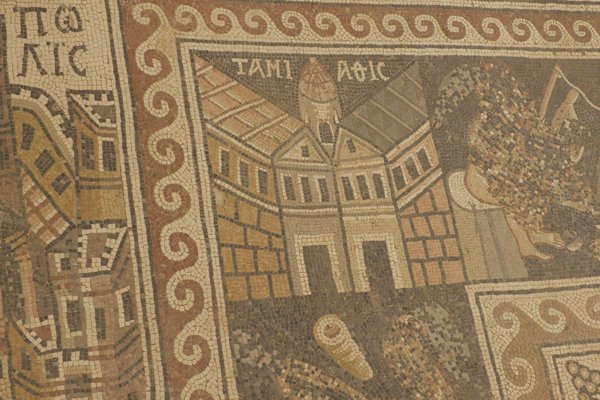Jordan
Um er-Rasas
Um er-Rasas (Kastron Mefa'a) is the archeological site of an important Christian monastic and pilgrimage center.
In the 8th century, there were at least 16 churches here, and pilgrims travelled from afar to see and consult the Stylite monks that lived on stone towers. One of those towers (14m high) is still standing. Noteworthy also is the mosaic floor of the Byzantine Church of Saint Stephen with its representation of towns in the region.
Community Perspective: You’d come here for the mosaics, which are well-preserved and protected from the sunlight by a kind of “hangar”, and the one remaining Stylite tower which lies about a kilometre away. Squiffy has written a comprehensive review about what you may expect.
Site Info
Official Information
- Full Name
- Um er-Rasas (Kastron Mefa'a) (ID: 1093)
- Country
- Jordan
- Status
-
Inscribed 2004
Site history
History of Um er-Rasas
- 2004: Advisory Body overruled
- ICOMOS recommended deferral for "Preparation of a comprehensive management plan ..and having a management system in place; Preparation of proper conservation plan for the whole site; Submitting a comparative analysis for sites of his kind in the region; Justify the Outstanding Universal Value and meeting of criteria.". The WHC members included Egy, Leb, Kuw and Oman
- 2004: Inscribed
- Inscribed
- Type
- Cultural
- Criteria
- i
- iv
- vi
Links
- UNESCO
- whc.unesco.org
- Related
-
- universes.art — Art Destination Umm er-Rasas
All Links
UNESCO.org
- whc.unesco.org — whc.unesco.org/
Related Resources
- universes.art — Art Destination Umm er-Rasas
News Article
- Nov. 25, 2017 khaosodenglish.com — Thais Vandalize Ancient UNESCO Site in Jordan
Community Information
- Community Category
- Archaeological site: Byzantine
Travel Information
Amman Hotspot
Recent Connections
-
Amman Hotspot
75km -
Archaeological potential
"This Unesco World Heritage Site contin… -
Umayyad Caliphate
"The Outstanding Universal Value of the…
Connections of Um er-Rasas
- History
-
-
Byzantine Empire and Civilization
The Outstanding Universal Value of the site resides in the extensive settlement of the Byzantine/Umayyad period (OUV) -
Umayyad Caliphate
"The Outstanding Universal Value of the site resides in the extensive settlement of the Byzantine/Umayyad period." (unesco website)
-
- Architecture
-
-
Mosaic art
-
Restored by anastylosis
AB evaluation "The arches were reconstructed as full anastylosis"
-
- Religion and Belief
-
-
Mentioned in the Bible
Kastron Mefaa(camp of Mefaa), a settlement mentioned in the Bible (Joshua. 13:18; 21: 37:and Jeremiah 48:21 -
Stylite
-
- Human Activity
-
-
Man-made Terraces
Cultivated terraces were built by damming the bottom of local wadis with low terrace walls (nom file)
-
- Constructions
-
-
Tower-houses
stylites -
Protective Shelters
over St Stephen's Church and part of the Church of the Lions (Unesco website)
-
- Timeline
-
-
Built in the 3rd century
Founded as a Roman camp (kastro). "It contains remains from the Roman, Byzantine and Early Muslim periods (end of 3rd to 9th centuries AD)" (AB ev)
-
- WHS Hotspots
-
-
Amman Hotspot
75km
-
- Science and Technology
-
-
Archaeological potential
"This Unesco World Heritage Site continues to be excavated, meaning further marvellous discoveries may yet be made."
-
News
- khaosodenglish.com 11/25/2017
- Thais Vandalize Ancient UNESCO Sit…
Recent Visitors
Visitors of Um er-Rasas
- Alberto Rodriguez Gutierrez
- Alexander Lehmann
- Alexander Parsons
- Aljaz
- Anna Wludarska
- Argo
- Astraftis
- Atila Ege
- bergecn
- Bill Maurmann
- Bin
- Boj
- Cezar Grozavu
- Chantal den Haan
- Cheryl
- Christer Sundberg
- Christravelblog
- Cluckily
- Clyde
- Corinne Vail
- Csaba Nováczky
- Cyberczar
- Daniel Gabi
- David Berlanda
- Dimitar Krastev
- Dimitrios Polychronopoulos
- DL
- Dr. Caligari
- Elaine McArdle
- Elena Y
- Elia Vettorato
- Els Slots
- Erik Jelinek
- Eva Kisgyorgy
- Fan Yibo
- Feldhase
- Filip Murlak
- Frédéric M
- Gary Arndt
- George Gdanski
- Gernot
- HaraldOest
- Harry Mitsidis
- henryjiao18
- Iain Jackson
- Ivan Rucek
- Jacob Otten
- Jana and Matt
- Jarek Pokrzywnicki
- Jay T
- Jeffrey Chai
- John Smaranda
- Juha Sjoeblom
- Justin
- KarenBMoore
- Kbecq
- KentishTownRocks
- Kevin McFarland
- Knut
- La Concy
- Lara Adler
- Lazerway
- Leonie Geurts
- Loic Pedras
- Lucio
- Ludvan
- Luis Filipe Gaspar
- Lukasz Palczewski
- Maciej Gil
- marcel staron
- MarcoB_0
- marc Rouserez
- Martin
- Martina Rúčková
- Michael Novins
- Michael Turtle
- Mihai Dascalu
- Mikan22
- Mikko
- Milan Jirasek
- Monica Tasciotti
- Morodhi
- Niall Sclater
- Nihal Ege
- PabloNorte
- Patrik
- Paul Schofield
- Philipp Peterer
- Ralf Regele
- Ralf Rotheimer
- Randi Thomsen
- Riccardo Quaranta
- RobRos
- rogerding
- Roger Ourset
- Roman Bruehwiler
- Roman Raab
- Sandra!
- Sehnsuchtsbummler
- Sergio Arjona
- Shannon O'Donnell
- Slavi
- sliny
- Squiffy
- Stanislaw Warwas
- Svein Elias
- Szucs Tamas
- Tarquinio_Superbo
- Tatiana Nikulnikova
- Thomas Buechler
- Thomas van der Walt
- Timothy C Easton
- triath
- ValiaVeweth
- Walter
- Westwards
- Wojciech Fedoruk
Community Reviews
Show full reviews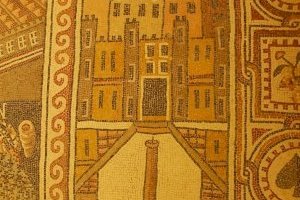
I had to check twice. There, below the catwalk on which I stood, was a man riding a goose. Close by men fished, oblivious to their goose-riding compatriot. It was a most unexpected thing to see – particularly in the ruins of an abandoned church. I’m used to World Heritage Sites which educate and inspire. It’s always nice to find one that amuses too. And in this instances it also encouraged me to study the other mosaic decorations of St Stephen’s Church in greater detail.
The history of Um er-Rasas is a confused one spread across many centuries. The ruins on site today are the remains of a local religious hub from the Byzantine era. The core site is not large, but includes the remains of a large number of churches. And a mile to the north stands a Stylite tower, a 15m tall pillar where Christian hermits would live apart from the world. It was previously known as Kastron Mefa’a. The ‘Kastron’ identifies it as a military camp (‘castrum’) on the eastern edge of the Roman Empire (so, should the current vogue for inscribing every single scrap of Roman limes as a World Heritage Site continue we may see this site inscribed twice). The ‘Mefa’a’ suggests that it was built atop or in the vicinity of the settlement of Mephaath, mentioned in the Book of Joshua as belonging to the tribe of Reuben. At some point it appears to have been incorporated into Moab for it …
Keep reading 0 comments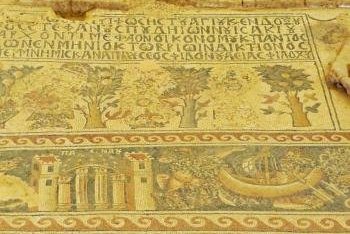
Of the four inscribed Jordanian World Heritage Sites I visited in spring 2015, Um er-Rasas was the one for which I had the least expectations, but I'm glad I went because I loved the mosaics in the church of St Stephen. The level of detail that went into the tessellated floors was impressive, depicting 8th century cities, flora and fauna, and scenes of daily life. Jordan has done a good job protecting the mosaics, with a shelter over the church and glass walkways that allow visitors to get close to the mosaics without damaging the floors. The remainder of the site outside the church is also well worth exploring, including the remains of an old Roman fort, homes, and other Byzantine churches. The visitor's center was closed when I arrived, as other visitors have noted, and there was no one selling tickets despite my arrival during scheduled opening hours; nevertheless the site was open and accessible. In addition to visiting the mosaics at Um er-Rasas, I also highly recommend a stop at the church of St. George in nearby Madaba, which has a renowned 6th century mosaic of Jerusalem and the Holy Land.
Logistics: Um er-Rasas is accessible by car, and is a short detour off the King's Highway south of Madaba.
Keep reading 0 comments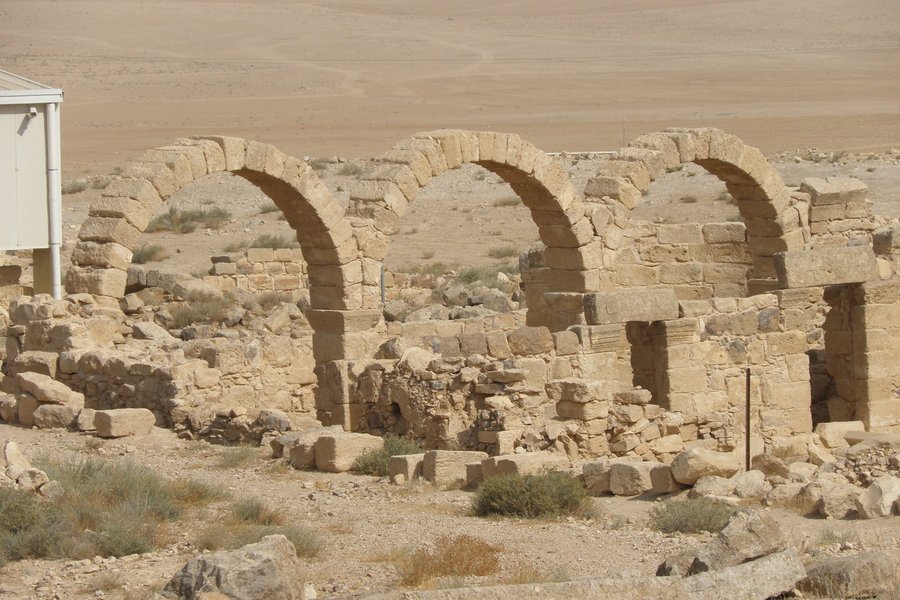
i've worked in this archeological site, every summer season since 1989 to the end of my thesis in the 1998. I was there to made the survey of the ruin during the excavation of lions church, pavoni church, and the rest of the area.
it's a special place full of history, unique for the presence of the mosaics floor and for the structures made of stone with their arches.
This place is worth a visit!
Keep reading 0 comments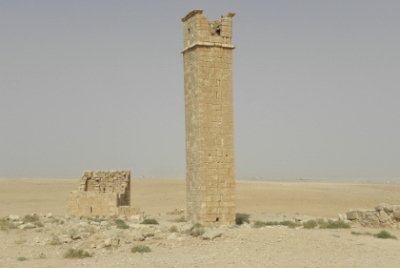
Um-er Rasas lies about 30km south of Jordan's mosaic capital, Madaba. It is signposted all the way. The only thing that you have to be careful about are Jordan's infamous speed bumps. The surrounding landscape is unbelievably dry and empty. No wonder it took so long to excavate this archeological site: only in 1986 work was started.
As other posters have already mentioned, there's a large visitor center and it has no less than two parking lots that also have spaces for numerous buses. However - the visitor center still seems to be closed, even on a Friday (the first day of the weekend for the Jordanians). A group of French tourists was just leaving when I arrived, and one family entered with me. We all did so without paying an entrance fee, as the ticket office was as closed as the restaurant, the souvenir shop, and the museum.
The main site is quite extensive, and without shade except for the covered building that houses the mosaics. I walked there as fast as I could under the radiating sun. The French that I encountered at the entrance all had very red heads, and that's anybody's fate here I guess.
After having seen several mosaics in Madaba this morning, I wondered about what Um-er Rasas had to add. Most organized tours only make a short stop at Madaba and skip Um-er Rasas altogether. Well, the design of the mosaics are quite similar, but these here seem to be …
Keep reading 0 comments
I visited this WHS in April 2010. The mosaics are still in very good conditions considering that they date back from between the 1st century and the 8th century AD. Unfortunately, the ruins aren't as aesthetically beautiful as others in Jerash.
Keep reading 0 comments
I visited Un er-Rasas on a short trip from Madaba, with a rental car. The road is more or less signe-posted from either the King's Road or the Desert Highway (small road on the right shortly after the airport).
We arrived in the late afternoon. They is quite a big vistors' center, but only the tourist police station was open. The ticket office was closed, so we entered for free. We were the only persons on the site.
The site consists of a large ruined city in various stage of restoration. The interesting part is the churches mosaic floors. The St Stephen church floor is visited from a stairway, an is covered by a kind of hangar. The floors are spectacular representing animals, flowers as well as towns of the region.
We then moved to the church of Lions. It seemed rather tame, covered with sand, until we discovered that under the sand lies the mosaics. Part of them only are visible, but getting on your knee's to push the sand aside to reveal the mosaic gives the impression to be the first person to uncovered a treasure.
We then climbed walls to get to the churches of the River and of the Palm Tree with more mosaics to uncovered.
About 2 km north of the site, we finished visiting the stylites tower, which is now completely restored.
Keep reading 0 comments
So I was in Jordan in March and did not want to miss this site and hired a driver to take my son and I out to Um er Rasas. The driver was a tour guide and he is out with tourists every day but he confessed that he has not been to this site in the last four years as no one wants to visit it! He took several wrong turns but a local farmer pointed us to the right road.
When we arrived, there is a beautiful brand new visitor's center. However the parking lot was empty as we were the only visitors at that time. Also all the facilities were not open except the rest rooms. The restaurant, visitor's hall, ticket office were all closed. The guard showed us to the back gate which opens to the site.
The previous descriptions are accurate. A whole pile of rocks strewn over a very large area. We walked around for a while taking pictures and then headed to a hangar like structure that covered the mosaics of St Stephen. The mosaics were superb and well worth the visit and the viewing platform allowed a top down view. Later we visited the stylite tower sitting by the road. Unfortunately, it is still being restored with scaffolding. On the other hand, since no one was on site, my son and I climbed the stairs of the scaffolding to the top of the tower and had a great view of the surrounding …
Keep reading 0 comments
I have visited the site in February 2008. From the main road is just a huge pile of stones (visible area of former fortified Roman Camp) but a lot of works have been done in the area of former Byzantine town. All the mosaics were covered with sand and wood to protect them while building roof (preservation project, grant from European Union). Also the "mystery tower" - another part of heritage - was covered with scaffoldings. What a bad luck. At that time the site was open to visitors free of charge with no tourist facilities. But the area is worth visiting, easy to reach by car from main road Amman-Aqaba.
Keep reading 0 comments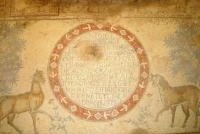
Quite recently appointed World Heritage Site, the Um er-Rasas (Kastrom Mefa'a) site first makes you wonder whether it belongs on the list at all? As this, almost non-excavated, site looks right now its more of a heap of rubble than anything else...! Some serious archeological work is needed here before you can make sense of this place. However, what makes it worth the effort of visiting, are the magnificent Roman mosaics in the small church of Saint Stephen.
Keep reading 0 comments
